Teryaki Salmon Skewers on Brown Rice
Once there was a time when most everyone knew what foods were in season. As recently as the 1970’s most of us still ate a majority of foods that were somewhat local and in season. But modern farming and shipping being what they are have changed that landscape to one of most every food being available most every month throughout the year. For instance, you can buy asparagus from South America in the US in October through December and beyond. Well outside of it’s normal season of April through June. Same with fresh cherries, and other fruits and vegetables.
Gone are the days of anxiously awaiting any given food season unless you are a strict locavore(one who eats only foods from their immediate area). I can’t wait for certain seasonal foods like, heirloom tomatoes, blueberries, peaches and salmon. I am guilty of buying some foods that are out of season here in the US, like apples from New Zealand, as well as a few others. Ever since I read the great book “Animal Vegetable Miracle” I have paid way more attention to buying local foods that are in season. I freeze, or can several seasonal foods to last through the winter as my grand parents did. It’s very gratifying to open up a jar of tomatoes in January that I canned in August or September.
Blueberries freeze exceptionally well, and last up to a year without losing much if any flavor. They just lose their consistency so I use them only for cooking. Salmon freezes very well and is quite edible 10 months after storing in vac-packed bags in my freezer. I usually go to Alaska every year for the last 20 years to catch a years worth of salmon to bring back as filets, and smoked salmon. I have only missed two years out of the last 20. This year was a typical year as far as the amount of salmon we caught. We fish for the very tasty Alaska Red Salmon(aka sockeye) and bring it home with us to eat and share for the next year.
We brought back a 45 pound box each filled with mostly red salmon fillets and several packages of smoked salmon we prepared using my smokers I left up there when I moved down to the lower 48 twenty years ago. These wild Alaskan salmon are not endangered, and we usually don’t have much trouble catching what we need for the year. It’s kind of a working vacation to stock up on an excellent source of protein. It is also a lot of fun.
It’s always special to eat that first fresh caught salmon at the cabin we rent in Soldotna. It’s also great each time we cook up the salmon we bring home and remember the fun we had on vacation catching it. One of our favorite ways to eat fresh or frozen salmon is to marinate it in teryaki. If the weather is good we grill it and serve it on steamed brown rice. If the weather is rainy we just bake it. Since we are always quite busy catching, cleaning, smoking and packaging the salmon it’s good to plan meals ahead when we can so I always cook double the salmon and brown rice we need as it makes a great leftover dish that we simply call “salmon and rice”. This is prepared by hand flaking the salmon to remove the bones and get the pieces down to size for mixing with the rice. The a saute pan is heated with a bit of olive oil(1 teaspoon or so) and cooking the rice and salmon together just until hot.
You could saute onions and celery first, and set aside for incorporating later after the rice and salmon are hot. You could also add frozen peas for some color, but whichever way you do it the flavor comes from the marinated salmon and carries the dish. It is a time saving way to do this dish that I hope you will try. It has you cooking once and eating two great meals from your effort. Sure you have to reheat it, but that only takes about 3-5 minutes. So give this dish a try with red salmon(sockeye), or whatever type of salmon you can get and see if you agree that this is a great way to cook once and eat twice.
Teryaki Marinade for Salmon
1- 1 1/2 pounds salmon
1 1/2 cup soy sauce
1/3 cup white wine, (Chardonnay or Savignon Blanc)
1/3 cup pineapple juice
1/3 cup sliced onion
3 cloves fresh garlic sliced, or crushed
1 teaspoon ginger powder
Mix all ingredients in a bowl and pour over salmon. Place in refrigerator for 1-2 hours. Drain and pat dry before grilling so it doesn’t stick. Cook skin side down for 5-7 minutes then cook for about 4 minutes skin side up.
Serves four
Note:
*If cooking bite sized pieces for skewers use less time in marinade, about 1 hour should do it.
*If using cooking wine with salt added use a low sodium soy sauce.
*Fresh grated ginger(1 teaspoon) can be substituted for powdered dry ginger.
*If you like a sweeter tasting salmon add 2 tablespoons of brown sugar to the marinade.




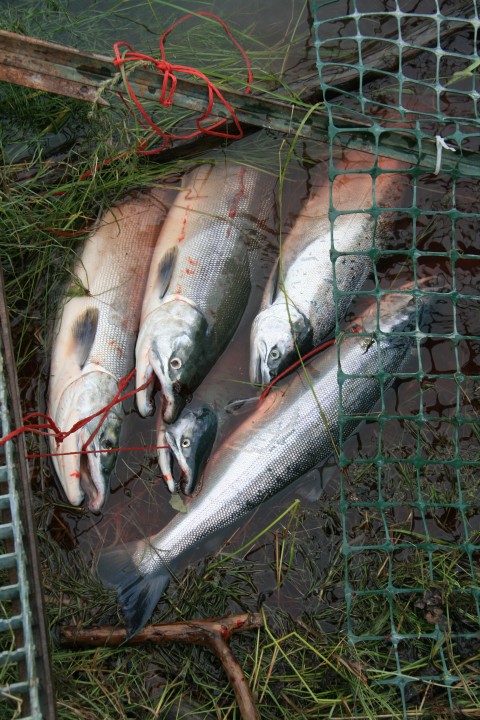
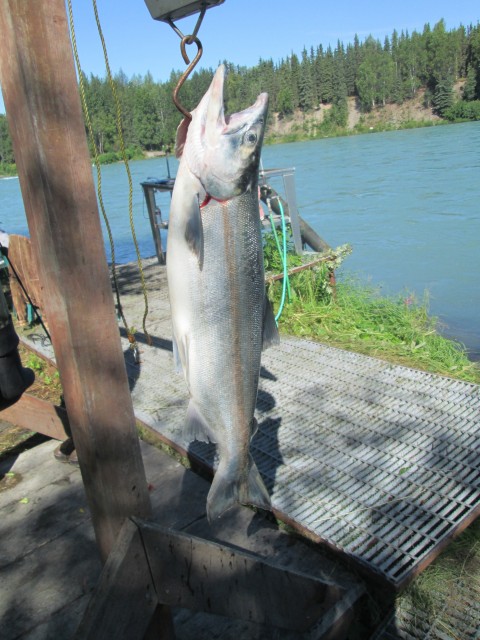
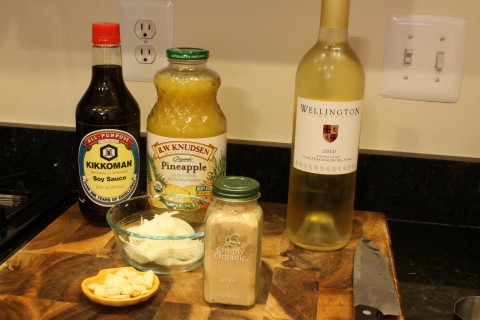
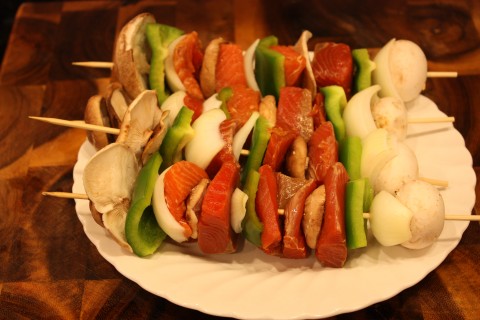
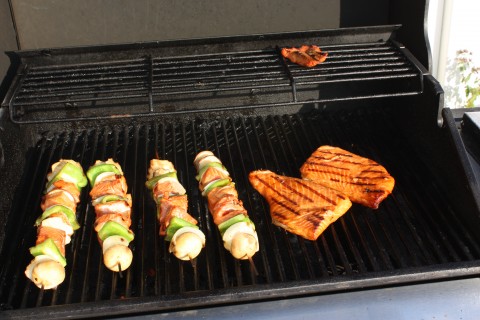
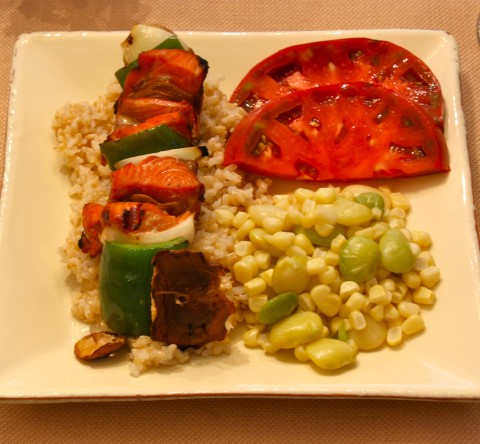

I love the looks of these kabobs!!! I am definitely into buying local, in season foods as well!
Thanks for your kind comments! I’m glad you took the time to read about local in-season foods.